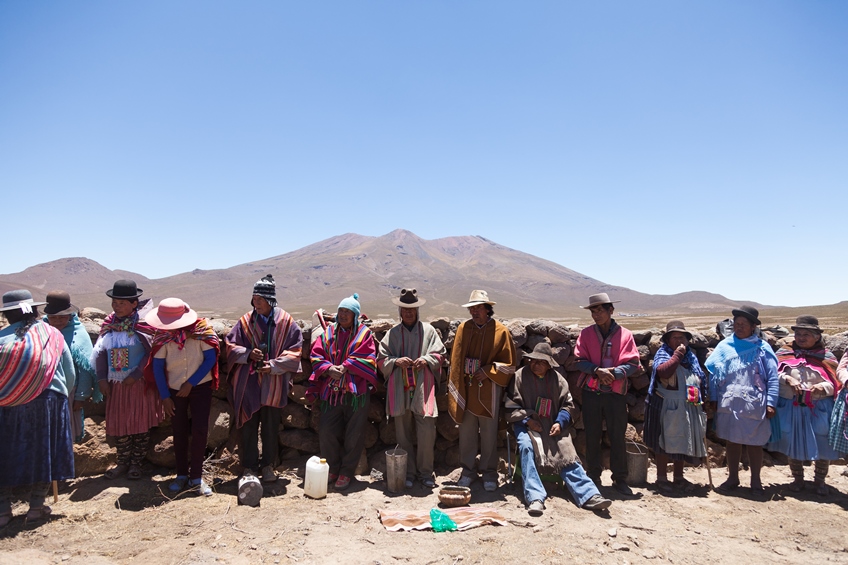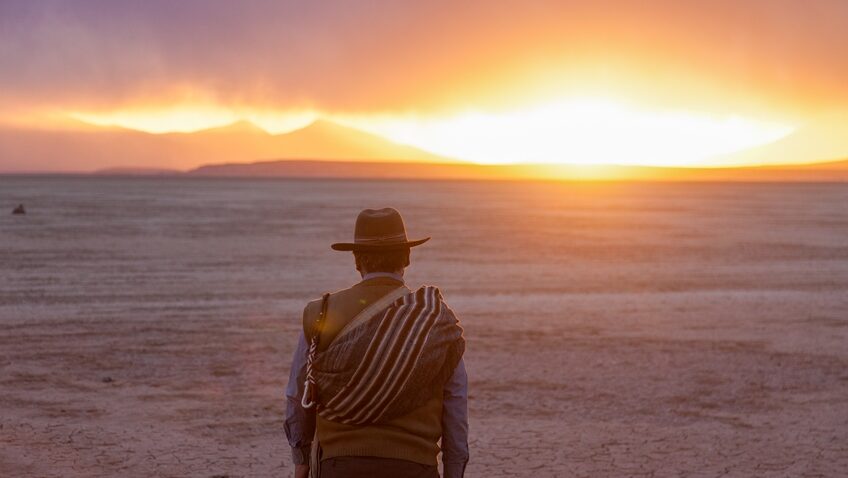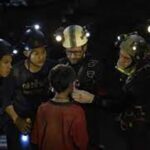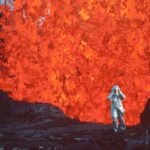Joyce Glasser reviews Utama (November 11, 2022) Cert. 12A, 87 mins.
It’s tough approaching 80 and living independently on the outskirts of a remote village without a car, a pension, or a supermarket within reach. So spare a thought for Sisa (Luisa Quispe) and Virginio (José Calcina) who live in a rickety, spartan farmhouse in Bolivia’s Altiplano (high plain in Spanish), where Virginio tends a herd of starving llamas and Sisa tends a vegetable patch that has not had rain in a year. Ask them why they won’t follow their son to a better life in the city and they might reply, “this is Utama” (“our home” in Quechua, one of the languages of the Altiplano).
The Altiplano is a photographer’s paradise with its jaw dropping desert vistas that invoke images of a Sergio Leone Western or Georgia O’Keefe’s paintings of animal skeletons in the New Mexican desert. At first you think that Alejandro Loayza Grisi’s impressive directorial debut is a National Geographic documentary, but the real life couple of Aymaran descent who portray Sisa and Virginio are two of the best nonprofessional actors you will see this year.
Loayza Grisi lets Barbara Alvarez’s spectacular wide-screen camera work make the case for why living on the most extensive high plateau outside of Tibet has such a hold on this couple. Dig a bit deeper and the same breath taking terrain suggests why so many inhabitants have chosen to leave. You can see why the film was selected as the Bolivian entry for the 95th Academy Awards in the International Feature Film category.
There are no creature comforts, banks, plumbing or hospitals. Tibet has its challenges, too, but does not have the Altiplano’s active volcanoes and a serious drought that threatens the survival of the inhabitants and the plants and animals they depend on.
Virginio walks miles every day with his beloved llamas to find patches of land where grazing is still possible. Lately, he is finding the routine increasing difficult because of a persistent cough. It could be the cumulative effects of age and the hypoxic air that, due to the plateau’s high elevation, lowers the level of oxygen in the arteries. Shortness of breath and coughing are symptoms of the problem. He hides his cough from Sisa, who senses something is wrong but knows her stubborn husband cannot give up the only life he knows.

Virginio is less sympathetic when Sisa complains about her chores. For years she has carried two empty buckets to the village and two heavy, full buckets back. Early on in the story, however, the village pump delivers its last drops. Now she has to walk much further to the river where the village women wash their clothes and the desperate llamas drink.
Then one day the couple’s grandson Clever (Santos Choque) shows up, much to his grandmother’s delight. Virginio’s reaction is more muted, and it is not long before the real motive for Clever’s visit creates conflict in the tiny household.
Virginio has stopped talking to his son since he moved to La Paz and displays a level of animosity toward his grandson, a caring young man with a new family of his own. Clever, who was raised in La Paz, wears a wireless headphone like a badge of modernity and unloads a suitcase full of luxury canned goods that the old couple feast on.
Clever is there to bring his grandparents back to the city with him. We sense that the idea of putting her feet up in La Paz and seeing her great-grandchild is appealing to Sisa, but what would Virginio do all day? Unlike her husband, Sisa is tolerant and non-judgmental, expresses her feelings physically and does not hold grudges. She enjoys having company and is firm with her husband that he had better not chase their grandson away.
The villagers who have resisted the temptation to call it quits, discuss the drought. A decision is made to carry out a traditional ritual sacrifice on a ragged mountain top to ask the spirits for water. We witness the whole community come together for this pageant of traditional folklore that is both a respite from and a reaction to the harsh reality of their everyday lives. Climate change is never mentioned in the film, but the villagers know that the rains are long overdue. When, after the ceremony, the skies remain blue, they can talk of little else.

Despite Sisa’s call for peace, Virginio remains hostile to his grandson and criticises his laziness. The hostility results in some heated exchanges. Even language is used to separate them, Clever speaking Spanish and his grandfather Quechua.
The ice melts a little when the two go out with the herd and Clever experiences his grandfather’s physically demanding routine. Here in the great outdoors, there is freedom and space; there are no corporate bosses or punch time clocks. You do not feel the pressure of the rat race, but the land is a merciless taskmaster.
While communication between grandfather and grandson is awkward, we sense an affectionate bond slowly building, particularly when, in a terrifying scene, Virginio disappears. Clever goes out alone to find him, and then earns his grandfather’s gratitude when he returns with the scattered herd. Virginio knows the land will kill him, but even a doctor’s (Jorge Yucra Nogales) diagnosis will not change his resolve.
The plot is minimal. The screenplay is as stark as the magnificent landscape, and the outcome offers no pat remedies or cause for optimism. Yet Utama becomes a tribute to the disappearing people of the Altiplano, and to Loayza Grisi’s sun-baked couple who retain their dignity in poverty and adversity and their love for one another. The ending holds a little surprise that is truly moving.




